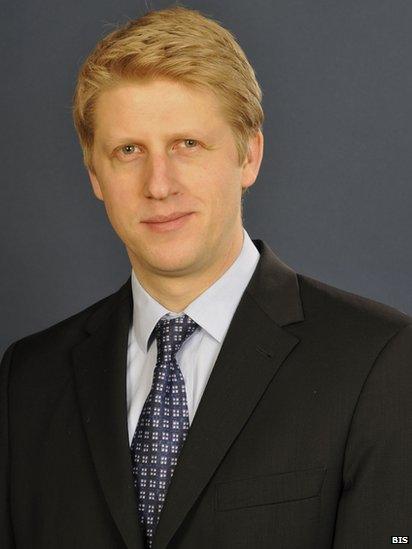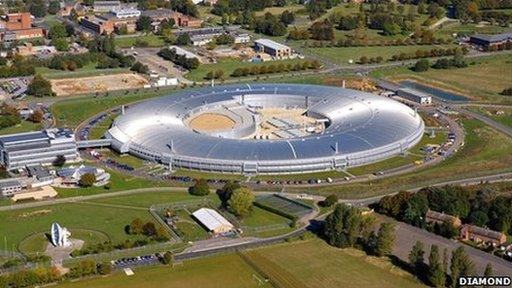World class science 'will endure' in UK after Brexit
- Published

Science Minister Jo Johnson has said that world class research would "endure" in the UK following a Brexit.
He added that researchers should be "optimistic about the future".
But Mr Johnson could not offer any assurances that UK universities could continue to receive billions of pounds of EU research funds.
The minister, who was appointed to the post last year, spoke to scientists at a parliamentary event organised by the Royal Society of Biology, external.
"In legal terms, nothing has changed overnight," he told researchers at the meeting. "We remain in the European Research Area. (European research) funding will continue to flow during this period.
"EU students who are already here, or are applying to start courses in the autumn, will have student finance in place for the full duration of their courses."
But those involved in science funding said that Mr Johnson and officials at his department (Business Innovation and Skills) were "unprepared" for the event of a win for the Leave campaign.
A senior official who did not wish to be named said that Bis had no plan in place in the event of a Brexit.

Science Minister Jo Johnson wants to reassure the science community but a source said there was "no plan"
"They are trying to gather information on what are the areas of research that depend most on European funding and what the priority areas should be. That information should have been collected weeks ago," said the official.
"That is why we are not hearing much from ministers. Civil servants are trying to keep them quiet because they don't want them saying anything that might be a hostage to fortune later.
"But that silence is just adding to this sense of weird uncertainty that no-one seems to have a vision for what should happen going forward."
Silent running
The reason for that silence is that in order to continue to receive EU research funding as the UK does now, the country has to be part of or have access to the single market - and so agree to the free movement of people.
Free movement was one dimension of EU membership that voters opposed in the referendum and so it will be impossible for Jo Johnson and his fellow ministers at Bis to make a plan until this issue is resolved - possibly by his brother Boris, should he become Prime Minister.
Nicola Blackwood, chair of the House of Commons Science and Technology Committee and Conservative MP for Abingdon and Oxford, said that the scientific community had to acknowledge that many people were worried by immigration, but there might be a way of squaring the circle by thinking "more creatively".
Some ideas, she said, could include taking students out of the immigration figures, having a shorter turnaround for visa applications and having a system that is more responsive to skills shortages.
"In the medium term, there will be uncertainty. The message needs to go out to scientists here and in Europe that we remain open for business," she said.
Ms Blackwood added that the Treasury had to commit itself to stepping in and making up any shortfall if EU funds were withdrawn.
Enormous benefits
Research leaders say that UK science benefits enormously from the free movement of scientists across Europe. It enables them to attract some of the best scientists in the world who are attracted by the UK's strong science base and the ease with which they and their families settle in the country. Britain also receives billions of pounds from EU research grants.
European Union money now amounts to nearly a tenth of university research funding. The president of the UK's Royal Society, Sir Venkatraman Ramakrishnan, told fellow researchers at the meeting that EU funding had kept UK science competitive at a time when British government science funding had been declining in real terms. But he added that it was not just about the money.
"A key component of it is funding for research networks that bring together scientists from the EU and beyond," he explained.
"These networks are vital in allowing scientists in Europe to collaborate and to propose and implement large research programmes that no single nation can afford. If we are excluded from EU programmes, we will be excluded from many of the collaborations and decision-making bodies, and we will lose our ability to influence new developments and new research directions."

The UK boasts some of the best research facilities in the world
Those who campaigned for the UK to leave the EU, such as Lee Upcraft, who speaks for Scientists for Britain and was a UKIP parliamentary candidate for Wantage in 2015, believe that the UK can negotiate a deal to receive EU funds while still controlling migration.
"Nobody is sure what the future relationship is going to be. That's where the science community needs to sit down with government and work out how best to go forward," he said.
"We don't know if we are going down a European free trade area route which would maintain freedom of movement or choose something more restrictive. But when it comes to EU research funds - look at countries like Turkey and Israel which receive EU research funds where we don't have freedom of movement - so there is no reason negotiations for EU research funds depend on freedom of movement."
Mike Galsworthy, of the pro-Remain campaign group Scientists for EU, said: "The minister is absolutely right to remind us that our relationship on the science programme and provision for EU students remains unchanged at this stage," he said.
"However, little can be done at the moment to prevent hiring or investment disruptions that may be occurring across academia and industry, other than to monitor it all as best we can. Ultimately, our relationship with the EU science programme and EU science policy will involve complex negotiations around freedom of movement and financial contributions."
Follow Pallab on Twitter, external
- Published26 February 2016

- Published17 July 2015
